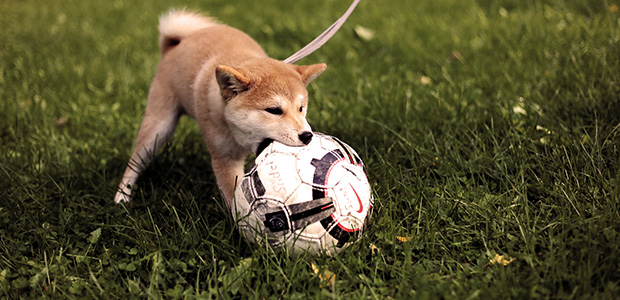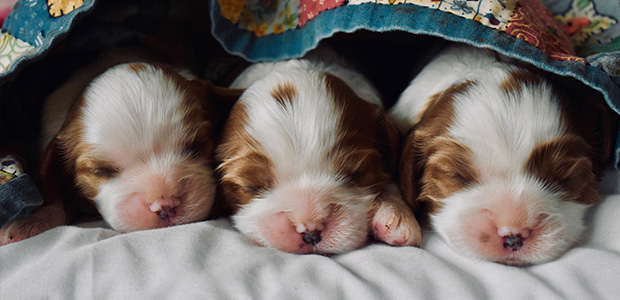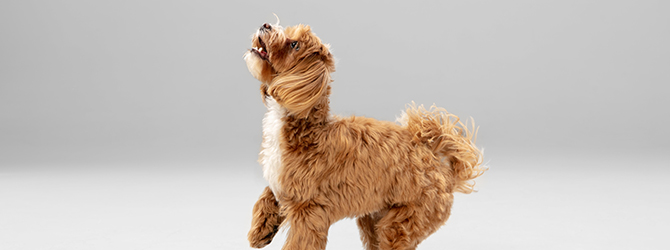How to stop your puppy from biting you
‘Ouch!’
Has your new puppy started to bite you?
Let’s take a look at the kindest and most effective methods of getting them to stop.
Background - why do puppies bite?
Puppy biting is a perfectly natural canine behaviour. When puppies bite, it’s usually for one of these reasons:
They’re teething - As a puppy’s baby teeth start to come through, or when they lose their baby teeth to make way for adult teeth, their mouth will feel strange, and probably sore. Their natural response to this will be to put their teeth to work; they may very well chew or bite anything they can get access to.
They’re trying to play - When puppies are first born, biting is a key part of how they interact with their mother and their littermates. If they accidentally bite too hard, their companion will quickly let them know, making them less likely to do it again. In other words, they learn by a trial-and-error-like process. As a result, they may associate biting with playtime, and may bite you when trying to get you to play with them.
They’re exploring - Puppies’ mouths are like humans’ hands; they explore their environment – what’s edible, what hurts, what they can play with etc. – by mouthing it.
They’re frustrated - Puppies may bite if they want something they can’t have, or if they’re hungry or tired.
They’re defending themselves - Puppies may bite if they feel the need to defend themselves.

Bringing your new puppy home
So biting is a behaviour that’s built in to your puppy naturally, and something they do to their littermates when they’re playing. But how do you stop it once you’ve brought your new puppy home?
Things to avoid:
Yelling - Yes, it hurts to be bitten, but remember that your puppy isn’t doing it maliciously. Besides, yelling only stops the incident there and then - it doesn’t address the underlying cause of your puppy’s behaviour.
Smacking or nipping – This is a definite no-no. Not only does it teach your puppy to be afraid of you, it also puts you in harm’s way if your puppy retaliates.
Rough play, especially with your hands - If playtime gets too heated and your puppy doesn’t have a toy to bite, chances are they’ll go for your fingers. Where possible, try to channel your puppy’s playful energy into productive activities that will strengthen the bond between you both.
Things to do:
Get your puppy used to being handled - Gentle handling is a key part of puppy socialisation. Aim to make it so your puppy is used to being handled by all members of the household - just make sure they’re handled safely (supervise children at all times), and no more than necessary.
Exercise - Because playful energy is a big part of what makes puppies bite, offering them an outlet for all their energy is a great way of tiring them out, and therefore reducing their urge to bite. Make sure your puppy gets plenty of exercise, both mentally and physically when needed.
Figure out why they’re biting – Deal with the cause to the problem. E.g. feed them if they’re due a feed, put them to bed if they’re tired.
Divert their attention to toys - Playing with toys is a fun and important part of integrating a young puppy into your home. It’s useful as a form of exercise, especially if your pup can’t go outside yet because they haven’t had their vaccinations.
When your puppy tries to bite you, put a tug-toy or a piece of rope between your fingers and their teeth. This will let them indulge their biting instincts and stop you from getting bitten at the same time!

Chewing
Like biting, chewing is a natural canine behaviour, especially for young puppies whose adult teeth are still coming through. Don’t aim to prevent them from chewing altogether. Instead, provide them with lots of toys they can chew, and make sure anything you don’t want them to chew - items of clothing, children’s toys, dangerous household chemicals etc. - is stored well out of their reach.
Your puppy may chew your furniture or TV cables too - things which are a bit harder to keep out of their way. To avoid this, aim to supervise your new pup at all times. If they try to chew something they shouldn’t, get their attention and ask them to do something. It could be to come to you, to sit down, or to play with a toy, etc. Once they’ve performed the command successfully, reward their behaviour with a treat, with a toy (that they can chew) or with a little bout of playtime.
If your puppy gets their paws on something they shouldn’t, such as a slipper, that isn’t dangerous, try to let them get on with it and remove it once they’ve dropped it. You could also use play, treats or toys to divert their attention away. Whatever you do, don’t chase your pup – they’ll think you’re playing with them.
At what age do puppies stop biting?
Now you know how to get your puppy to stop biting you, it’s only natural to wonder when the biting impulse will stop altogether.
Most puppies will stop biting once all their adult teeth have come through - usually around 7 months of age. This may vary depending on the habits they pick up early on in life. I.e. if your puppy is well trained, they’re far more likely to stop biting once their adult teeth have come through.
Need more info?
For more help and advice on how to get your puppy to stop biting you, welcoming your new puppy into your home or any aspect of their health and wellbeing, have a chat with your local vet - they’ll also be able to recommend a qualified dog trainer or behaviourist if appropriate.
Find your nearest vet using our Find a Vet page, or speak to a vet online using Online Vets.

